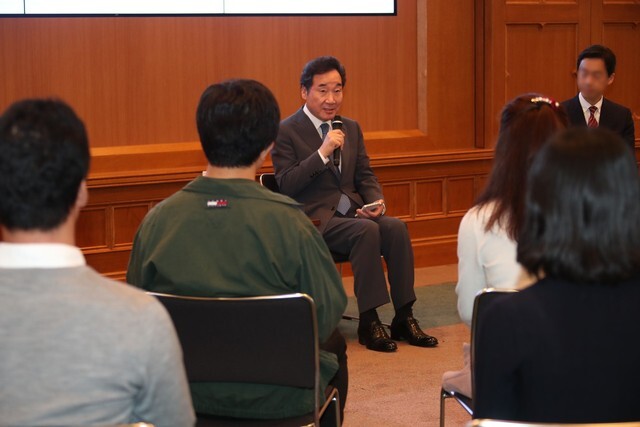hankyoreh
Links to other country sites 다른 나라 사이트 링크
S. Korean prime minister advocates separating economics and politics in relations with Japan

South Korean Prime Minister Lee Nak-yeon, who is currently visiting Japan, proposed addressing the current strain in relations between the two sides with a principle of “keeping politics separate from the economy.”
Meeting on Oct. 23 with Japanese students at Keio University, Lee said, “If it isn’t possible to resolve everything right away, I think a better approach to start with would be for politicians to let go and say ‘let’s resolve economic issues in economic terms,’ and start working on fixing those.”
Lee’s remarks were a response to a question from a Japanese student who noted the negative impact on local economies from the decline in South Korean tourism and asked if there were any “signs of a resolution” for South Korea-Japan relations.
“Politicians need to produce a bit more wisdom and efforts to address the feelings of discomfort for citizens of both countries,” Lee added.
Lee also stressed the importance of promoting interaction among members of the younger generation.
“What pains me most personally when South Korea-Japan relations are not going smoothly is the wound it leaves on young people,” he said.
“We need to come up with means of support that the interchange between young people is not affected by the situation,” he added.
At the same time, he stressed, “If the fathers’ generation has tended to view bilateral relations through the lens of scars left by history, then it’s the older generation’s duty to enable young people to look at the other side without any of those scars.”
During an invitational luncheon for overseas Koreans in Japan that afternoon, attendees called on the South Korea government to work more actively to improve ties with Japan.
“Ninety-nine percent of Zainichi Korean children go to Japanese schools. We’d like for [South Koreans] to think about how those children feel right now attending [Japanese] schools,” said Seo Soon-ja, a deputy department director in the central headquarters of the Korean Residents Union in Japan (Mindan). “Overseas Koreans are facing a life or death situation.”
Meeting with reporters after attending a palace banquet hosted by Emperor Naruhito on the evening of Oct. 22, Lee said his aim in his upcoming meeting with Japanese Prime Minister Shinzo Abe was to “foster a climate where dialogue can be encouraged as much as possible.”
By Lee Wan, staff reporter
Please direct comments or questions to [english@hani.co.kr]

Editorial・opinion
![[Editorial] Yoon must halt procurement of SM-3 interceptor missiles [Editorial] Yoon must halt procurement of SM-3 interceptor missiles](https://flexible.img.hani.co.kr/flexible/normal/500/300/imgdb/child/2024/0501/17145495551605_1717145495195344.jpg) [Editorial] Yoon must halt procurement of SM-3 interceptor missiles
[Editorial] Yoon must halt procurement of SM-3 interceptor missiles![[Guest essay] Maybe Korea’s rapid population decline is an opportunity, not a crisis [Guest essay] Maybe Korea’s rapid population decline is an opportunity, not a crisis](https://flexible.img.hani.co.kr/flexible/normal/500/300/imgdb/original/2024/0430/9417144634983596.jpg) [Guest essay] Maybe Korea’s rapid population decline is an opportunity, not a crisis
[Guest essay] Maybe Korea’s rapid population decline is an opportunity, not a crisis- [Column] Can Yoon steer diplomacy with Russia, China back on track?
- [Column] Season 2 of special prosecutor probe may be coming to Korea soon
- [Column] Park Geun-hye déjà vu in Yoon Suk-yeol
- [Editorial] New weight of N. Korea’s nuclear threats makes dialogue all the more urgent
- [Guest essay] The real reason Korea’s new right wants to dub Rhee a founding father
- [Column] ‘Choson’: Is it time we start referring to N. Korea in its own terms?
- [Editorial] Japan’s rewriting of history with Korea has gone too far
- [Column] The president’s questionable capacity for dialogue
Most viewed articles
- 1Months and months of overdue wages are pushing migrant workers in Korea into debt
- 2Trump asks why US would defend Korea, hints at hiking Seoul’s defense cost burden
- 3At heart of West’s handwringing over Chinese ‘overcapacity,’ a battle to lead key future industries
- 4[Editorial] Yoon must halt procurement of SM-3 interceptor missiles
- 5Fruitless Yoon-Lee summit inflames partisan tensions in Korea
- 6AI is catching up with humans at a ‘shocking’ rate
- 7Dermatology, plastic surgery drove record medical tourism to Korea in 2023
- 81 in 3 S. Korean security experts support nuclear armament, CSIS finds
- 946% of cases of violence against women in Korea perpetrated by intimate partner, study finds
- 10Amnesty notes ‘erosion’ of freedom of expression in Korea in annual human rights report